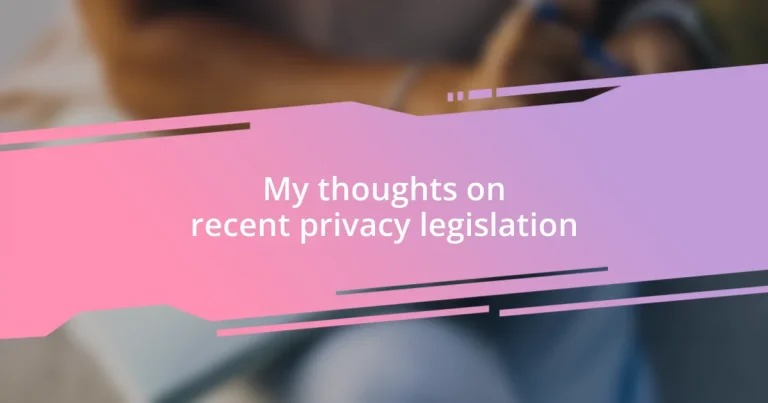Key takeaways:
- The implementation of privacy laws like GDPR and CCPA empowers consumers by enhancing their control over personal data and increasing organizational transparency.
- Key changes include the requirement for explicit consent from users, timely data breach notifications, and the right to request data erasure, fostering accountability among companies.
- Advocacy for stronger privacy rights is essential, leading to greater clarity in privacy policies and collective efforts to protect individual data rights in the digital landscape.
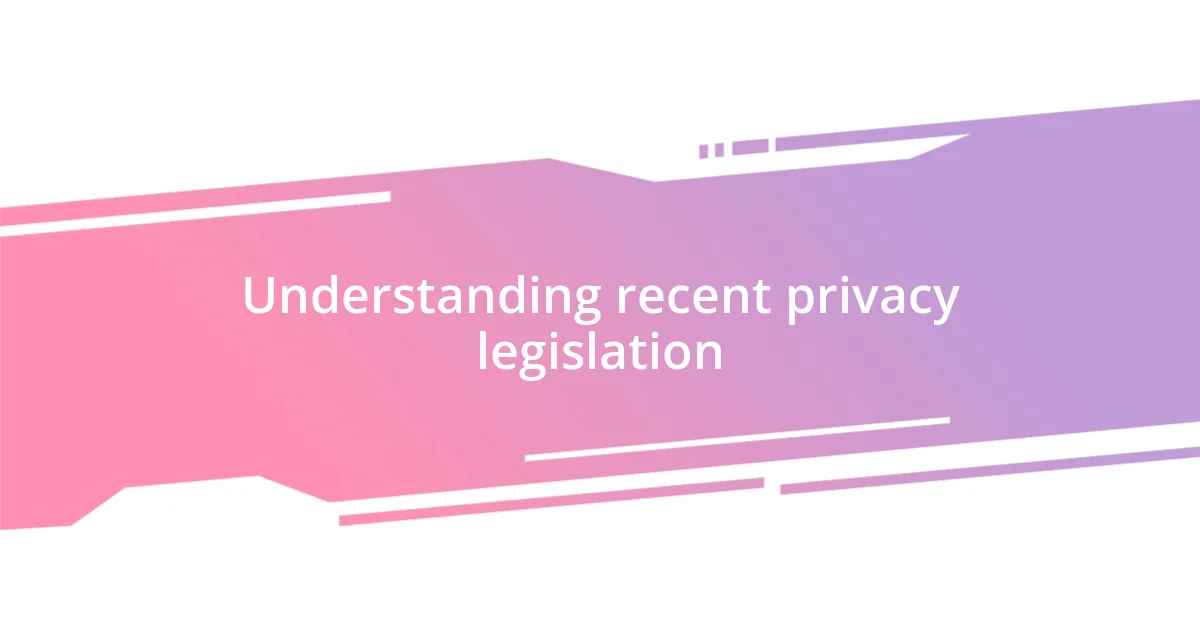
Understanding recent privacy legislation
Understanding recent privacy legislation is crucial in our digital age. I remember when the General Data Protection Regulation (GDPR) was implemented in Europe; it sparked a wave of changes globally. It made me realize how much power consumers could actually wield when it comes to their personal information.
As I examine the recent developments, I can’t help but wonder: how much do we truly understand about the data we share online? It often feels overwhelming, doesn’t it? For instance, the California Consumer Privacy Act (CCPA) has raised important questions about our privacy rights, giving California residents more control over their personal data.
These laws aren’t just legal jargon—they affect our daily lives deeply. I recall having to constantly adjust my privacy settings on various platforms after realizing how much of my data was accessible. It’s empowering yet daunting to think about all the implications of these legislative changes; they remind us that being informed is a key part of safeguarding our digital selves.
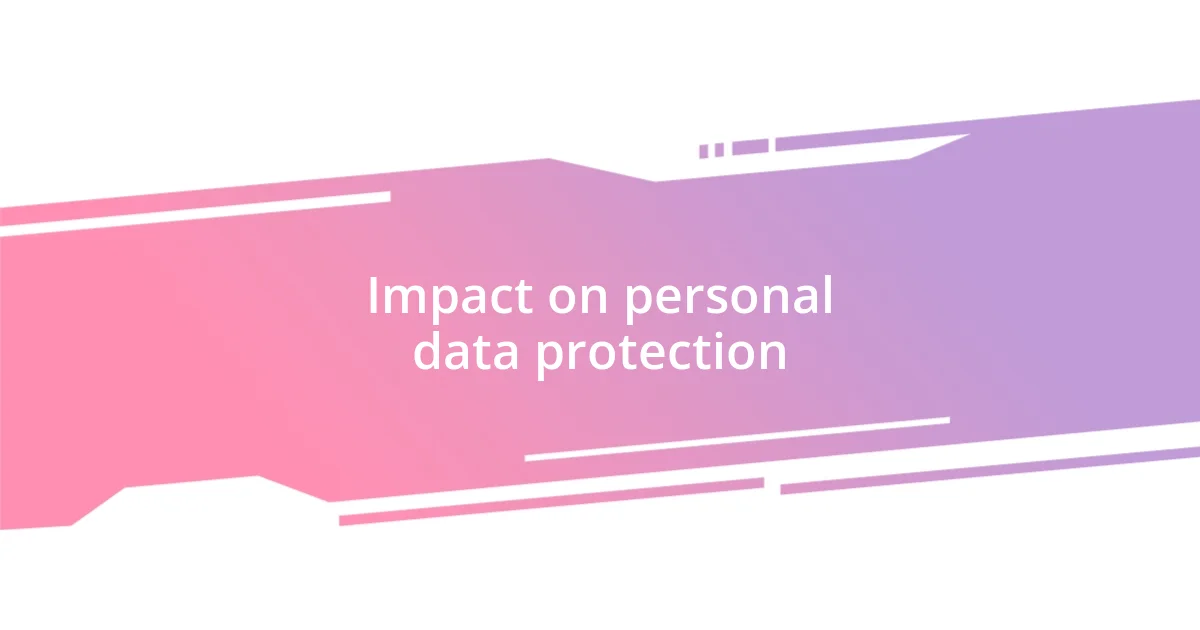
Impact on personal data protection
The recent privacy legislation has significantly impacted personal data protection, pushing organizations to adopt more rigorous data handling practices. I remember when my favorite app updated their privacy policy, and it made me reassess the value of the data I was sharing. It’s fascinating how this shift encourages companies to prioritize transparency, giving us more insights into how our data is used.
With laws like the GDPR and CCPA in place, there’s a newfound emphasis on accountability. I’ve found that many companies are now more willing to engage in dialogues about their privacy practices, which feels like a refreshing change. It’s almost reassuring to see organizations working harder to maintain trust with their users and viewing compliance as a priority rather than an afterthought.
However, it’s essential to recognize that while these regulations are a step forward, there’s still a long way to go. For instance, not all consumers fully understand their rights under these laws, which can leave them vulnerable. I often ponder how this knowledge gap can be bridged. This reflection reminds me of conversations I’ve had with friends who feel lost when trying to navigate their privacy settings. It highlights the critical need for better education on personal data rights and protections.
| Aspect | Impact of Recent Legislation |
|---|---|
| Transparency | Increased clarity on data usage |
| Accountability | Companies held responsible for data breaches |
| User Control | Empowerment through enhanced rights |
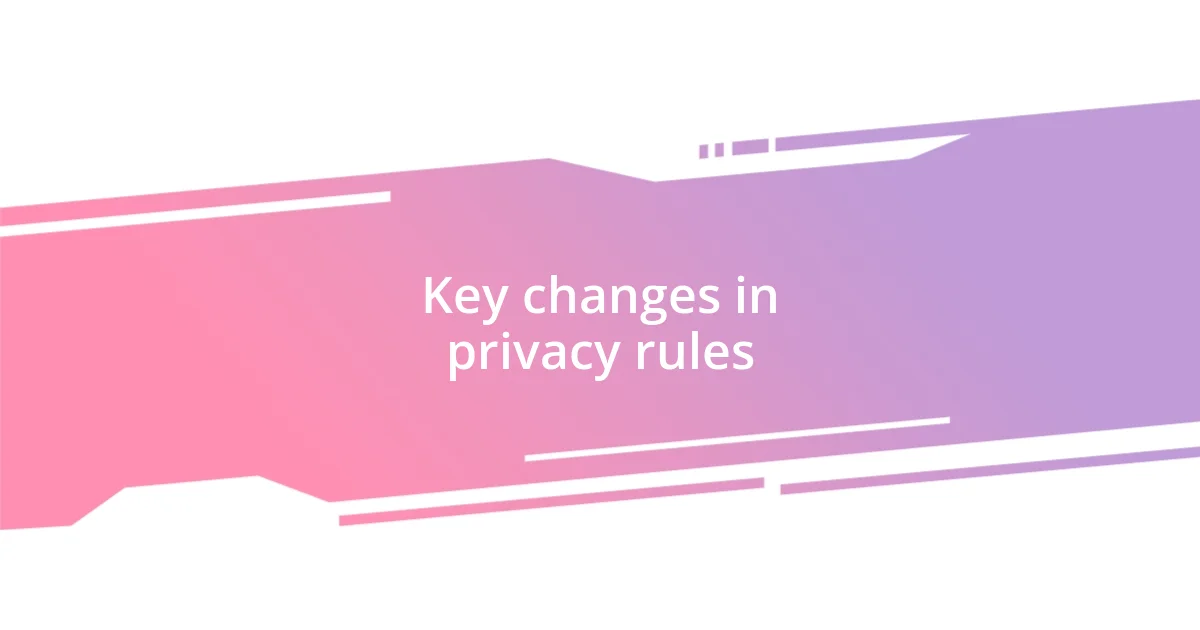
Key changes in privacy rules
The latest revisions in privacy rules are reshaping how organizations manage our personal data. One significant shift I’ve observed is the requirement for companies to obtain explicit consent from users before processing their data. This change resonates with me, as the last time I read through a lengthy privacy policy, I felt overwhelmed by the fine print and wishfully hoped for something more straightforward. Now, with clear consent guidelines, there’s a greater emphasis on making these policies understandable, and I believe this is a crucial step towards transparency.
Here are some key changes I’ve noticed:
- Explicit Consent: Organizations must now clearly inform users and obtain consent before collecting data.
- Data Breach Notification: Companies are required to notify users promptly in the event of a data breach, which adds a layer of security.
- Right to Data Erasure: Users can request the deletion of their personal data, giving them more control over their information.
Understanding these changes has not only educated me but also made me more vigilant about my online interactions. I feel a sense of empowerment, knowing the boundaries companies must adhere to and how they can’t casually mishandle our information. There’s a mix of relief and hope that these regulations will foster a culture of respect for personal data, allowing us to engage online with more confidence.
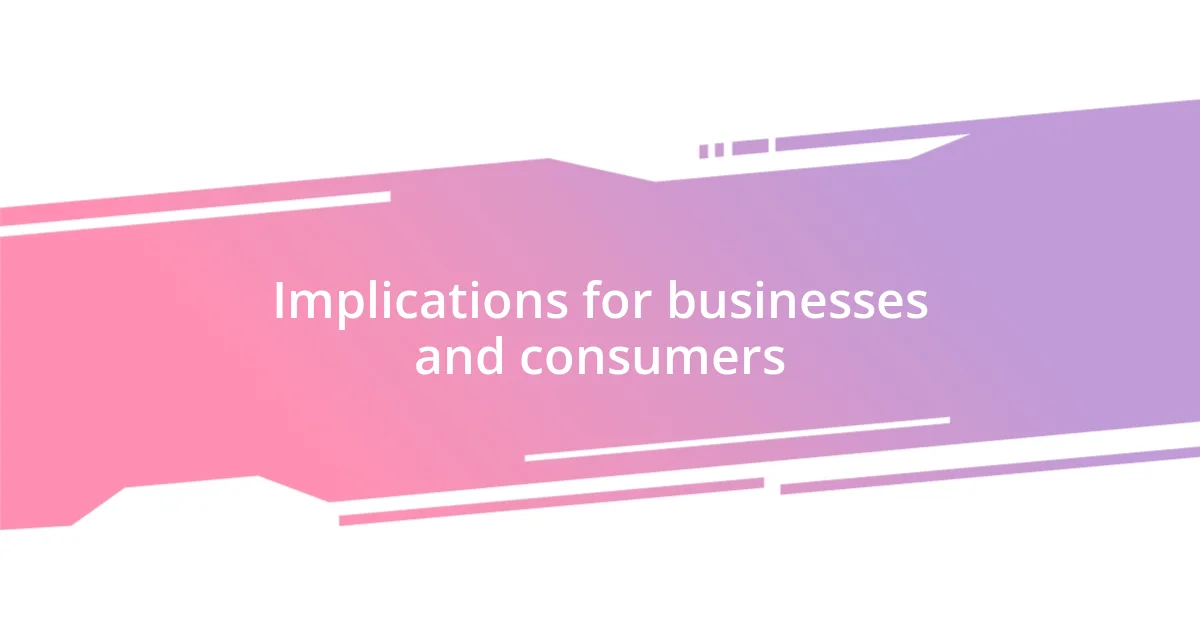
Implications for businesses and consumers
The implications of recent privacy legislation are profound for both businesses and consumers. From a business perspective, I’ve seen many companies struggling to comply with these new regulations. I remember chatting with a friend who runs a small online store. She shared her anxiety over updating her privacy policy while ensuring it aligned with the new laws. This pressure can lead to increased operational costs, which smaller businesses might find overwhelming. It raises an essential question: how can these companies balance compliance with maintaining profit margins?
For consumers, these changes offer both empowerment and confusion. I vividly recall getting an email from a service I use, informing me about my newly enhanced rights. It made me excited to delve into my privacy settings, but it also left me questioning whether I truly understood what I was reading. Many consumers may feel similarly lost or even hesitant to engage, fearing unintentional missteps in managing their data. This makes me wonder if companies could do more to simplify these processes and offer clearer guidance.
Additionally, trust is a significant outcome of these legislative changes. I once had a frustrating experience with an app that mishandled my data, leading to mistrust that lingered long after I deleted it. Now, I think about how recent regulations compel companies to take accountability seriously. It’s a pivotal shift, but can we really expect all businesses to embrace this responsibility genuinely? This question often lingers in my mind, emphasizing the ongoing journey we’re all on to create a safer digital landscape.
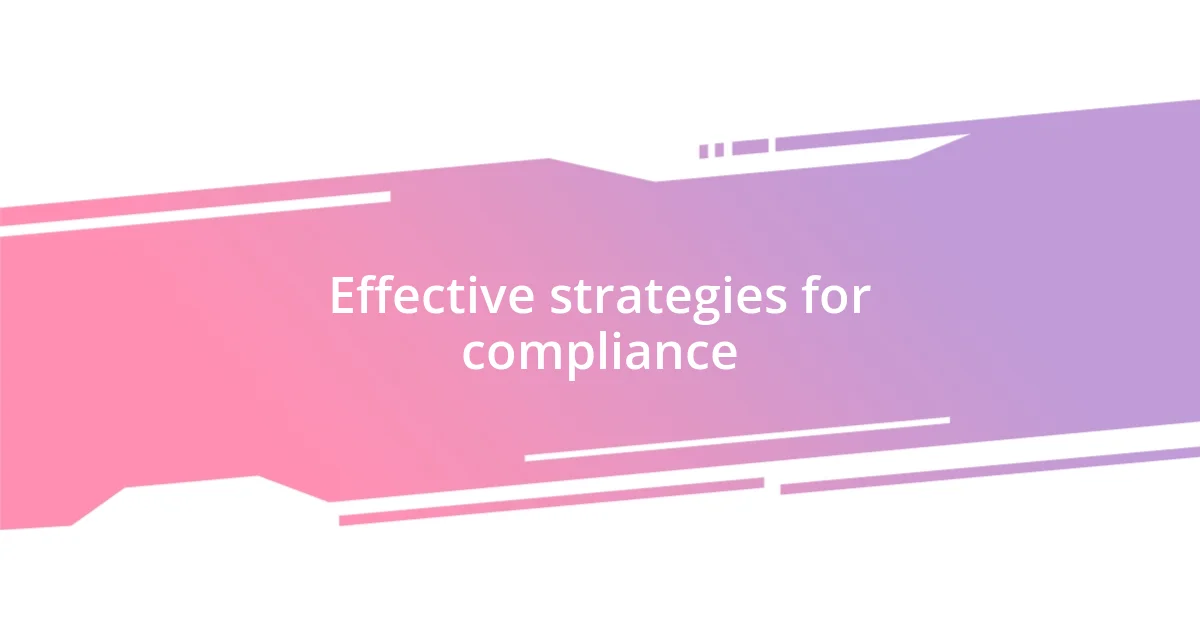
Effective strategies for compliance
One effective strategy for compliance is to foster a culture of awareness within the organization. I remember attending a workshop where we discussed the nuances of data privacy laws. It struck me how crucial it is for every employee, not just the IT department, to understand their role in protecting personal data. Implementing regular training sessions can empower staff to recognize potential data breaches and improve overall compliance.
Another essential approach is to conduct thorough audits of current data practices. In my experience, taking the time to identify where data is stored and how it’s processed reveals hidden vulnerabilities. I once worked with a company that discovered they were holding onto outdated customer information unnecessarily, which not only created compliance issues but also cluttered their data landscape. Regular audits can help streamline processes and ensure adherence to new regulations.
Finally, developing transparent communication strategies with consumers is vital. I recall a time when I received an update from a favorite app about changes to their privacy policy. Instead of feeling lost, I appreciated the straightforward language they used. This kind of clarity not only builds trust but also aligns with the regulators’ expectations for explicit consent. Organizations need to prioritize clear communication to engage users in a meaningful way. Are your compliance strategies making your users feel informed and secure?
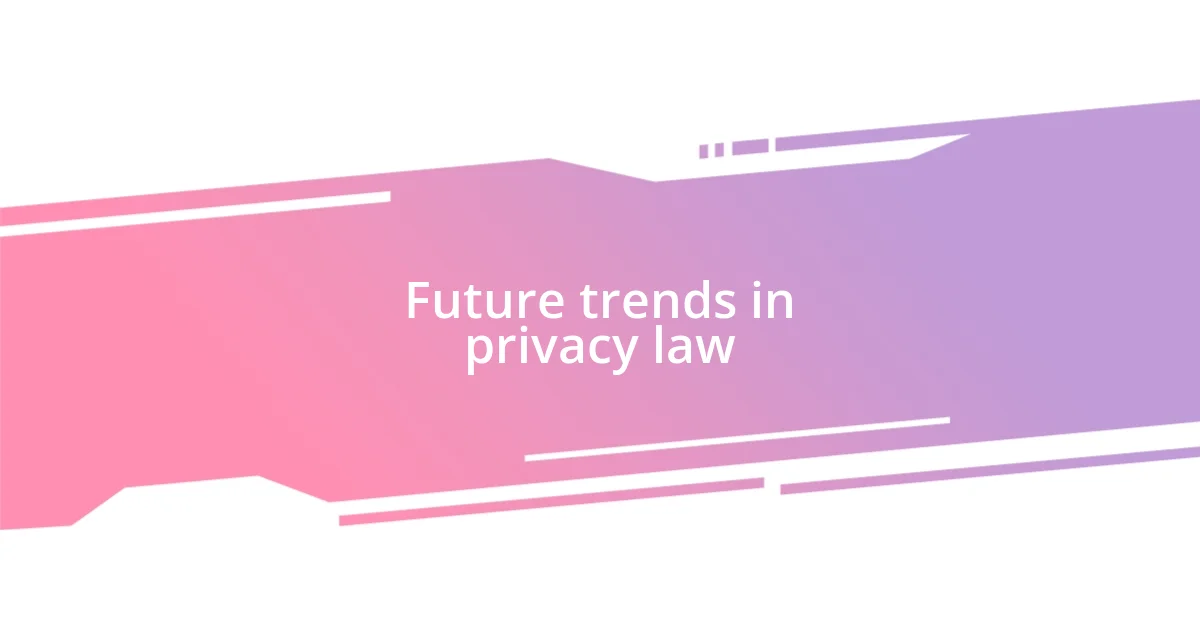
Future trends in privacy law
As I look ahead at the evolving landscape of privacy law, I can’t help but think about the growing emphasis on data minimization. This concept resonates with me because it encourages companies to collect only the data they genuinely need. I once worked with a startup that took this approach and was amazed at how much more streamlined their processes became. It lead me to wonder, how often do we really question the necessity of the data we collect?
Another trend I foresee is the rise of international privacy frameworks that promote consistency across borders. In conversations with friends in different countries, I’ve learned that navigating varying laws can feel like traversing a maze. I remember discussing the complexities of GDPR compliance with a colleague in Europe, who shared the challenges faced by small businesses. The idea of harmonizing regulations could ease some of this confusion, making it simpler for companies and consumers alike. But will global cooperation truly align, or will we continue to see divergence in practices?
Lastly, the integration of advanced technologies, like artificial intelligence, in ensuring compliance is something I’m particularly excited over. I’ve seen firsthand how AI can streamline data analysis, helping organizations stay ahead of potential breaches. However, it raises an important question: could reliance on technology lead us to overlook the human element of data privacy? Trust is built through connections, and I can’t shake my belief that personal engagement remains essential in this digital age.
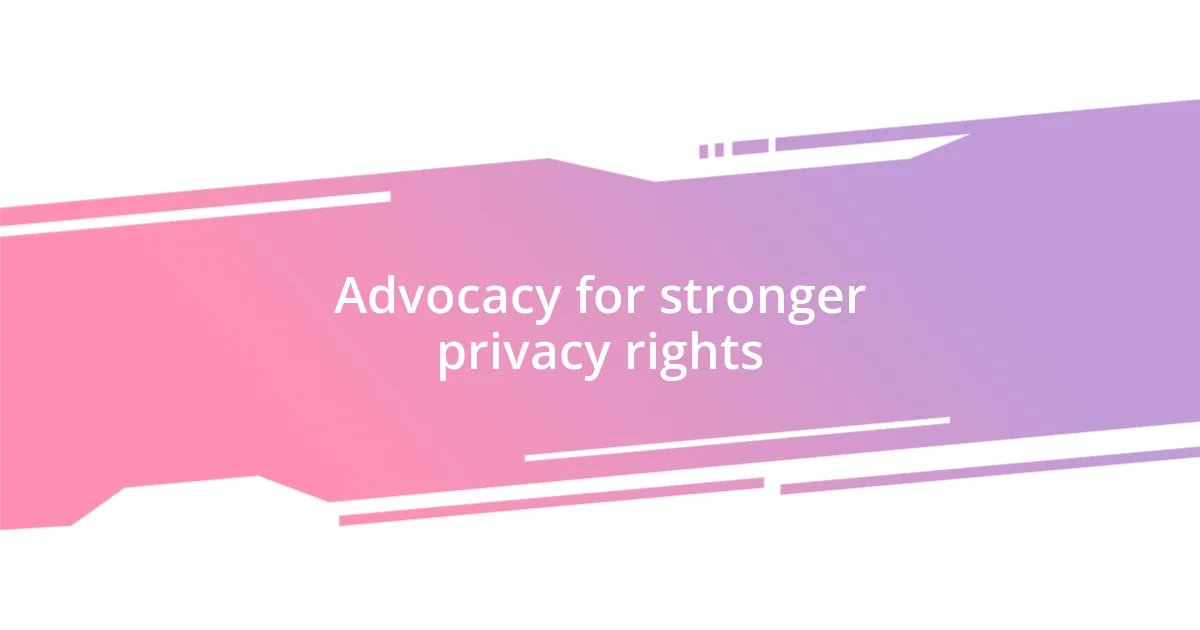
Advocacy for stronger privacy rights
Advocacy for stronger privacy rights is crucial in today’s digital landscape. I often find myself reflecting on personal experiences where my privacy felt compromised, like when I discovered that an app I used shared my data without my consent. This not only made me uncomfortable but also had me thinking: how many people are blissfully unaware of similar practices? Strengthening privacy rights would give individuals more control over their data and empower them to make informed choices.
When I think about the advocacy efforts for better privacy legislation, I’m reminded of the conversations I’ve had with friends from various backgrounds. They often share their frustrations about endless user agreements filled with jargon that nobody understands. One memorable discussion we had revolved around how we could urge our local legislators to prioritize clarity in privacy laws. Wouldn’t it be wonderful if everyone could truly grasp the significance of what they’re agreeing to? Stronger privacy rights can lead to more transparent policies, making it easier for all of us to feel safe and secure online.
Moreover, I believe that real change comes from collective action. I recall attending a community meeting where passionate speakers emphasized the importance of privacy rights. Their fervor was infectious, inspiring attendees to voice their concerns and demand accountability. It made me realize that advocacy isn’t just about policy changes; it’s about a shared commitment to protect our rights. Are more of us ready to step up and join this important conversation? As advocates, we can create a landscape where robust privacy rights become the norm, not just a dream.












